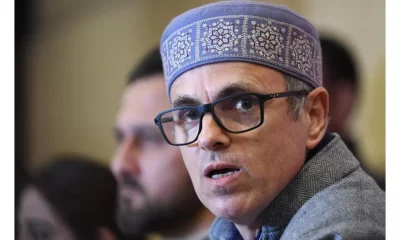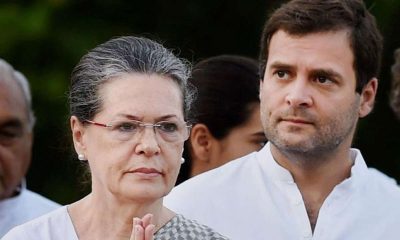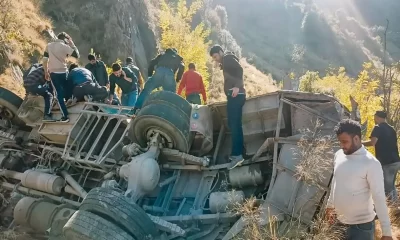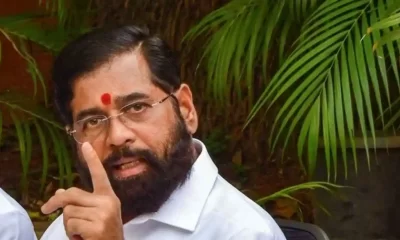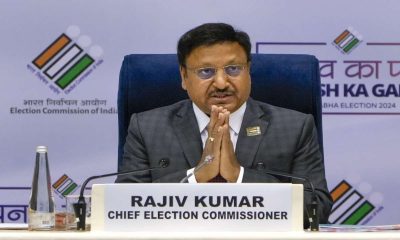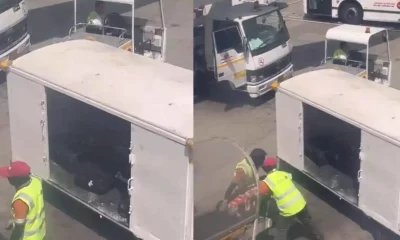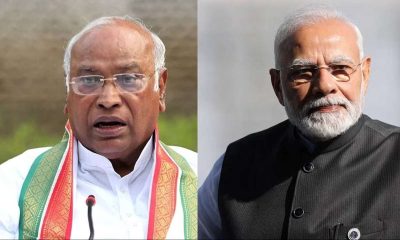India News
Kashmir: Confusion and alarm as yatras cancelled, Governor tries to reassure, Omar wants clarification in Parliament
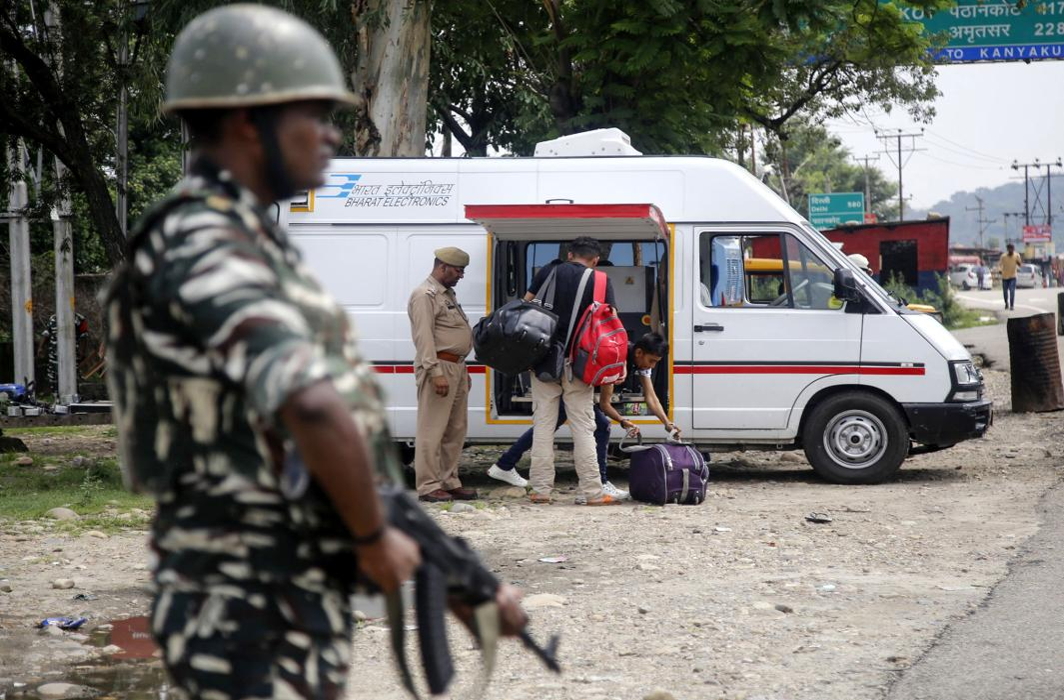
Alarm and confusion prevailed in Kashmir after an unprecedented troop build up, cancellation of Machail yatra after Amarnath yatra citing security threat and suspicion that all this was a build-up to withdrawal of special Constitutional provisions relating to Kashmir.
Kashmir is still under President’s rule – euphemism for central rule through the Governor – and statements from the government instead of allaying suspicions have had the contrary effect.
Jammu and Kashmir Governor Satya Pal Malik today (Saturday, Aug 3) said the state had “no knowledge” of any changes to constitutional provisions. His statement came after a delegation of leaders from the National Conference, led by former chief minister Omar Abdullah, apprised him of the “panic” following the suspension of the Amarnath Yatra and subsequent order for yatris and tourists to leave.
Malik explained that there were “vulnerable” people, who did not know the area and could be targeted in a terrorist or fidayeen attack. “It is the responsibility of the state to provide security to all its citizens.”
On the sudden increase in the deployment of troops, Malik said the security situation has developed in a manner which required “immediate action”.
“There were credible inputs which were available to the security agencies regarding terrorist attacks on the Amarnath Yatra. There has been intensified shelling on the LoC by Pakistan which was responded to effectively by the Army,” the Governor said, adding that it is in this context that the government had issued an advisory asking Yatris and tourists to return as soon as possible.
Also Read: Pak terrorists plan to target Amarnath yatra, sniper rifle & landmine found on route
Abdullah also said that the Governor had “assured” the NC delegation that there were “no preparations” on any announcement on Article 370, 35A or trifurcation of the state.
“We wanted to know about the current situation. When we ask officials, they say something is happening, but nobody knows what is actually happening,” Abdullah said in a press conference post-meeting.
Abdullah said that Malik’s words were not “final” and that he would prefer hearing them from the Centre. “The Governor isn’t the final word on J&K. The final word on J&K is the Government of India. Therefore, I definitely would like to publicly hear from the government that there is nothing people have to worry about.”
He demanded that the government make a statement during the ongoing session of Parliament on the current situation.
A day after cancelling the Amarnath yatra, the J&K administration today suspended the annual Machail Mata pilgrimage in hilly the Kishtwar’s Paddar area adjoining Kashmir Valley.
Machail yatra in Kishtwar’s Paddar area had started last month and it was to continue till September 5. Thousands of people from across the Jammu region visit the temple of Goddess Kaali situated at a height of 9.795 ft above sea level in Paddar area which also has world-famous Sapphire mines located nearby.
The chopper service from Kishtwar to Machail too has been suspended, sources added.
Yesterday, Governor’s administration in an unprecedented decision had suspended Amarnath Yatra 13 days ahead of the schedule, asking pilgrims and tourists in the Valley to leave as early as possible in view of intelligence inputs about terror attacks. The yatra to South Kashmir which had started last month was to culminate on Raksha Bandhan day which falls on August 15.
Unprecedented in the last 30 years of insurgency in Kashmir, these steps have alarmed the people into preparing themselves for emergency. Locals have rushed to stock up on essentials, including petrol, groceries and money from ATMs.
Airlines have waived cancellation charges, tourists are packing up to leave, and even the National Institute of Technology in Srinagar had suspended classes “stands suspended till further orders”.
“We have inputs of a major militant strike on the Yatra and the tourists. There have been some recoveries too, as revealed by the Director General of Police and the Corps Commander in the press conference. That’s why this decision,” Additional DGP (Law and Order) Munir Khan was quoted as saying by The Indian Express (IE).
The seizure of Pak-origin weapons displayed at the press conference yesterday strengthens New Delhi’s case that the terror tap from across the border is still very much open.
There have been conflicting indications from the government before this. Just about a week ago, senior government officials were upbeat about “grassroots democracy” gaining traction in the Valley with panchayats being empowered over the last nine months since elections and were celebrating the fact that yatra pilgrims had breached the numbers recorded the previous year.
Then a couple of days ago, the state government suddenly issued an advisory suspending the yatra for four days citing weather conditions. Simultaneously, it withdrew the Jammu and Kashmir Police’s armed forces from the yatra duty. “For all practical purposes, the yatra is over,” said an official.
Earlier, on July 25, the Union Ministry of Home Affairs (MHA) ordered deployment of 100 companies of Central Armed Paramilitary Forces (CAPF) to “strengthen the CI (counter-insurgency) grid as well as for maintaining law and order situation in J&K”. This was later described by the police as a “relief to over-stretched training companies of J&K Police on duty since panchayat elections last year”.
The additional troop deployment came on top of 400 companies of paramilitary forces rushed by the Centre to J&K after the Pulwama car bombing on February 14 this year.
Two days later, reported IE, J&K Police sent a wireless message to police officers asking them to “communicate shortfall or riot control equipment/ gas gun…for special law and order duties”. The police in the Valley were also asked to keep a satellite phone and bulldozer at every police station hinting at possible snapping of communication networks.
A day later, on July 28, a Divisional Security Commissioner of Railways in the Valley asked railway officials to store ration for four months, not to keep their family members in Kashmir and to restrict staff leave due to “emergency situations”. The letter said precautionary security measures have been directed after receiving inputs from “different security agencies” including SSP Railways Srinagar regarding “forecast of deteriorating situation in Kashmir valley and issue of law and order for a long period”.
The same day, another order was issued by police asking its officers in Srinagar to “provide details of mosques and their management… for onward submission to higher authorities”.
What was weird was that the government termed these orders as “fake” and even said it would act against rumour mongers. J&K Governor Satya Pal Malik said on July 30, “None of the orders being shown are valid, there is a lot of rumour mongering here and no need to pay attention to that. Everything is fine, everything is normal.”
While these “fake” orders had come from officers, the Governor’s advisor, K Vijay Kumar, said it would not be proper for him to counter every time there was a rumour. DGP Dilbagh Singh said the police would act against rumour mongers. “There is nothing to worry. People should not take these fake orders seriously. Some miscreants are hell bent to disturb peace in the Valley and they will certainly face the music.”
Non-BJP political leaders in the Valley believe all these measures suggest that the establishment is preparing for “defining action” in the Valley which could include diluting or abrogation of Article 35A that defines the state residents of Jammu and Kashmir and their rights.
2024 Lok Sabha Elections
Bollywood actor Neha Sharma campaigns for her father Ajit Sharma in Bhagalpur, Bihar
The Bollywood actor posted a video on her Instagram handle which showed her journey through various districts of Bihar, including Kishanganj, Banka, Purnea and Katihar. She was dressed in a traditional salwar kameez and was seen greeting and encouraging the public to cast their votes.
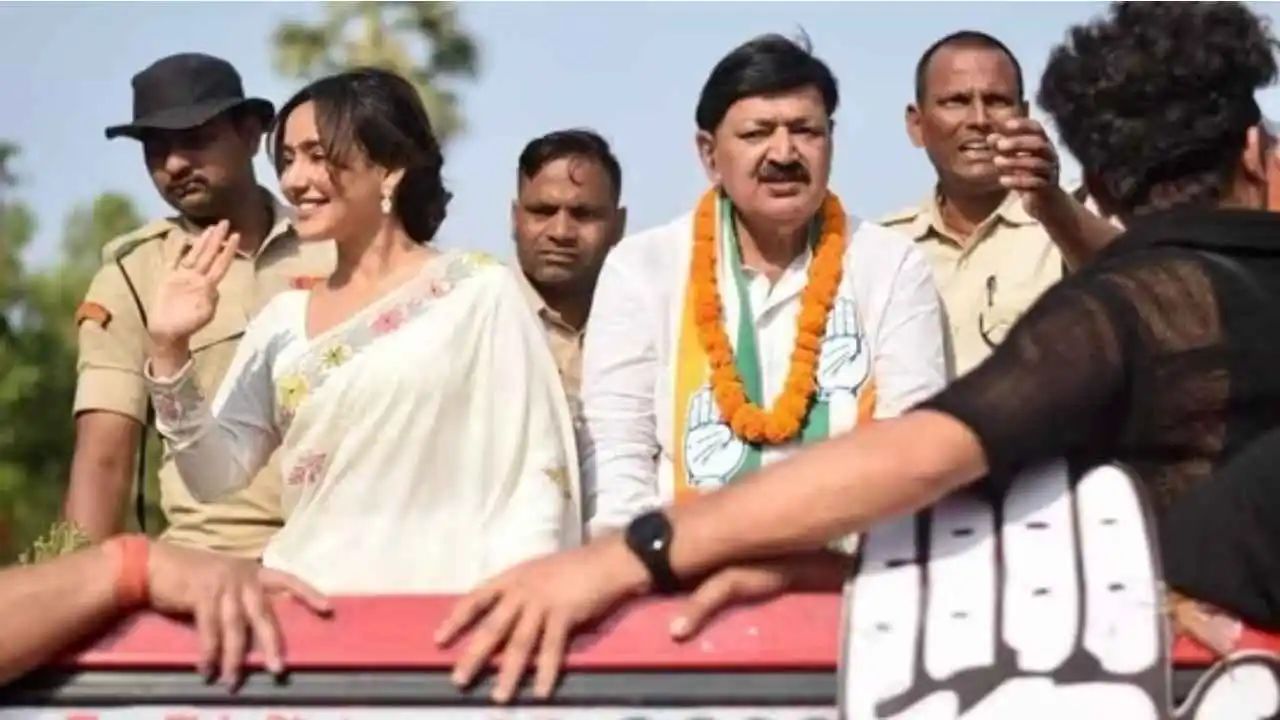
Bollywood actor Neha Sharma’s recent participation in a roadshow in Bihar has taken the internet by storm. Sharma, known for her roles in films like Tum Bin 2 and Crook, was seen supporting her father, Ajit Sharma, who is contesting from Bhagalpur Lok Sabha seat on a Congress ticket. The roadshow came amid speculations that the actor might enter politics. But, it is now clear that she was just campaigning for her father.
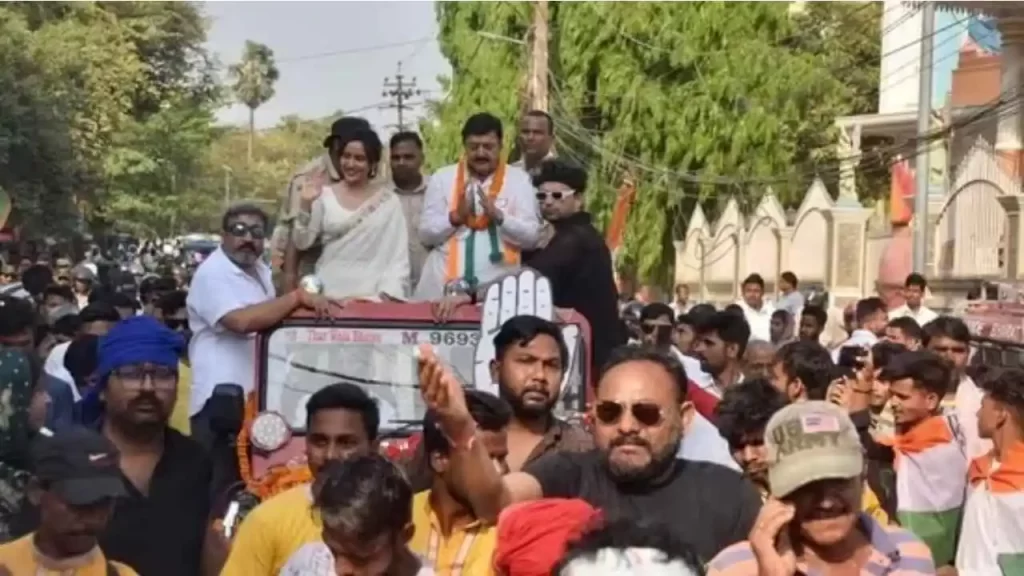
The Bollywood actor posted a video on her Instagram handle which showed her journey through various districts of Bihar, including Kishanganj, Banka, Purnea and Katihar. She was dressed in a traditional salwar kameez and was seen greeting and encouraging the public to cast their votes.
The actor received a warm reception and love from a large crowd in Pirpainti and Kahalgaon during her roadshow. She wrote on Instagram that it is said when someone gives one a place in their heart, then they live there forever. She said her heart is full of all the love and support she was receiving from the people. She thanked the people for the warm welcome she got in Pirpainti and Kahalgaon. Aapka pyar sar ankhon par.
Another video, circulating on social media showed the actor actively participating in her father’s election campaign in Bhagalpur. The election to the Bhagalpur Lok Sabha seat is set to take place in the 2nd phase on April 26. Ajit Sharma is representing the Congress and is up against JDU’s Ajay Kumar Mandal in this seat.
Earlier, there had been rumours and speculations that Neha Sharma might join politics. But many reports have clarified that she is not making her political debut yet. The Bollywood actor had been offered the opportunity to join politics by her father Ajjit Sharma but she is currently focusing on her acting career.
Education
Farmer’s son Nilkrishna Gajare Nirmalkumar from Maharashtra scores 100 NTA score in IIT-JEE Mains 2024
Nilkrishna Gajare’s father is a farmer and had to discontinue his own education after Class 12 as he faced financial difficulties. Gajare faced financial challenges growing up. However, his unwavering dedication and strategic approach to preparation set him apart from the crowd.
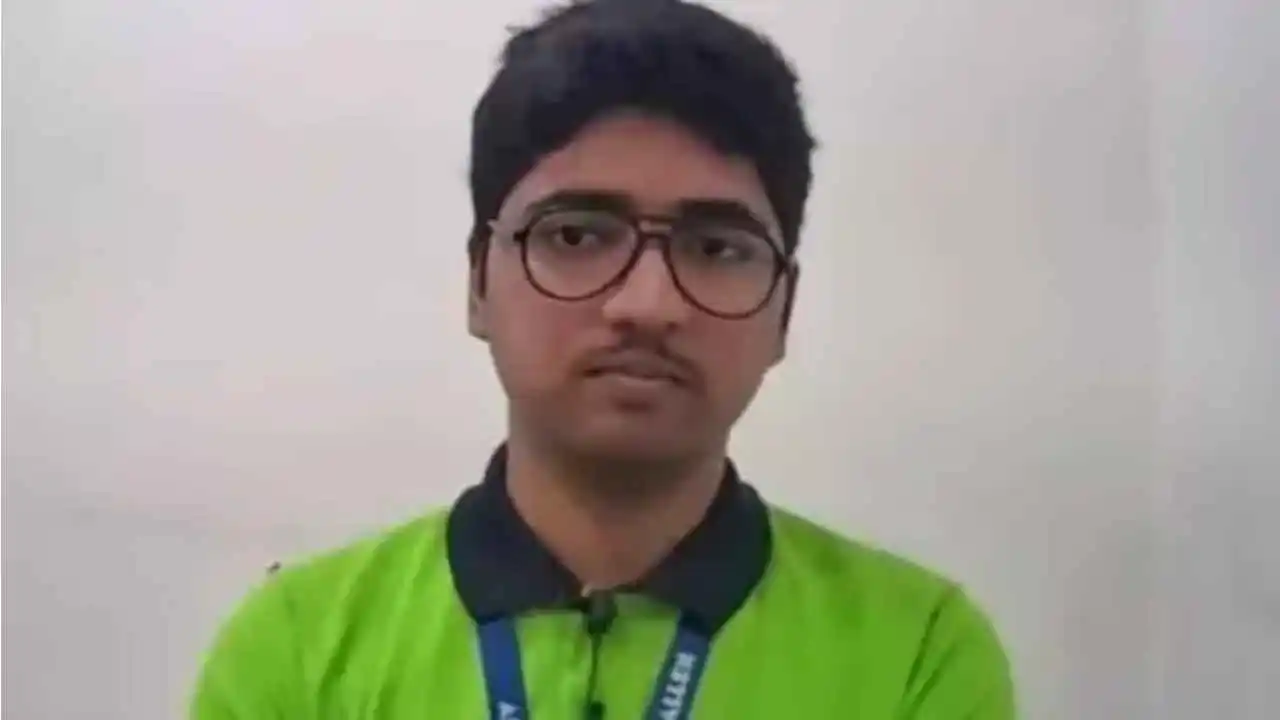
Nilkrishna Gajare, who hails from Maharashtra’s Washim, achieved an extraordinary feat by securing a perfect score of 100 in the JEE Main 2024 examination. His journey from humble beginnings to the pinnacle of success is a source of inspiration for many people.
Nilkrishna Gajare’s father is a farmer and had to discontinue his own education after Class 12 as he faced financial difficulties. Gajare faced financial challenges growing up. However, his unwavering dedication and strategic approach to preparation set him apart from the crowd, which resulted in his remarkable achievement of emerging as topper of one of India’s toughest Engineering entrance exams.
Nilkrishna Gajare had a strategic plan that helped him succeed in IIT-JEE 2024. According to Nilkrishna persistence is important and one should never stop trying until they understand a topic. He said being curious and asking questions are important traits of a good student. He said one should not be ashamed of asking questions.
Nilkrishna spent around 10-15 hours every day studying on his own for the JEE Main exam. He mentioned that he used his class notes for Physics and Physical Chemistry. For organic chemistry and inorganic chemistry, he relied on both notes and practice questions.
As for Mathematics, he believed that practicing regularly was the most important thing for him. Other interests of Nilkrishna include archery. He has participated at both state and national levels, and he finds joy in the sport. He said archery helps him understand the importance of focusing his attention on his goals. Nilkrishna likes watching movies and said they are a great source of enjoyment and relaxation.
He likes to watch a movie after exams and occasionally treats himself to one each week too. Gajare aims to keep up the pace for the JEE-Advanced exam and hopes to get into the IITs. He said he wants to secure admission in IIT-Bombay in the computer science branch.
2024 Lok Sabha Elections
Lok Sabha elections: Samajwadi Party chief Akhilesh Yadav files nomination from Kannauj
The Samajwadi Party has announced Akhilesh Yadav as its official candidate for the Kannauj Lok Sabha seat today
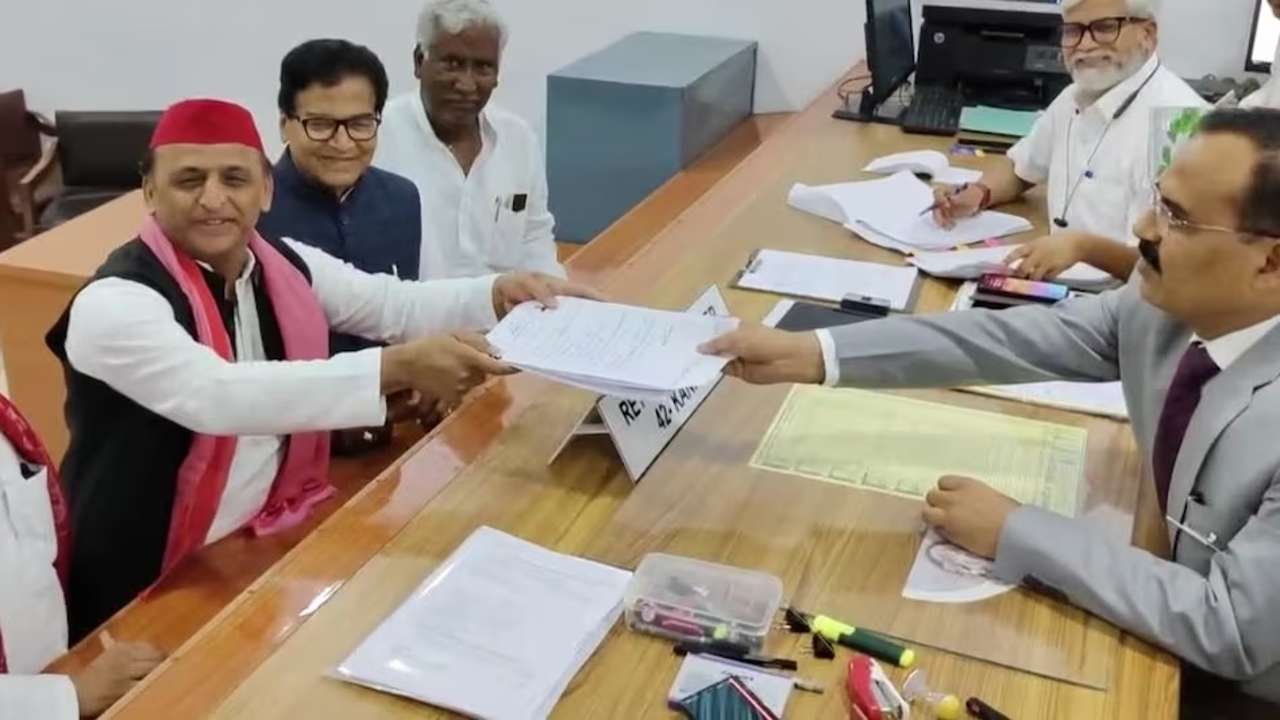
Samajwadi Party (SP) chief Akhilesh Yadav, submitted his nomination for the Kannauj Lok Sabha constituency ahead of tomorrow’s second round of voting. In front of Ram Gopal Yadav and other party leaders, the chief of the SP, who had previously contested the seat in 2000, 2004 and 2009, submitted the nomination.
Speaking with media, Ram Gopal Yadav said that SP would win the seat by a huge margin. The BJP candidate might lose his deposit in the seat, he said.
The Samajwadi Party has completely reversed its earlier plan to field former Mainpuri MP Tej Pratap Singh Yadav as their candidate, which is a significant political development.
Earlier, Akhilesh Yadav told reporters, people will find out when the nomination takes place, in reference to the speculations that he will contest for the seat. The historic victory of Kannauj is the subject of inquiry.
The former chief minister continued, the people have decided that the India bloc is coming as the future and the BJP will be history in this election.
Notably, elections for the Kannauj seat are scheduled for May 13, which would intensify the political drama that is now playing out in Uttar Pradesh. Previously regarded as the Samajwadi Party’s stronghold, the seat was lost by the party in the 2019 election when Subrat Pathak of the BJP won with a resounding victory.
The candidates competing for the following Uttar Pradesh seats will find out their destiny in the second round of voting, which is scheduled for tomorrow, Amroha, Meerut, Mathura, Baghpat, Aligarh, Ghaziabad, Gautam Buddh Nagar, and Bulandshahar.
Notably, two Bollywood celebrities running as BJP candidates in the second round are Hema Malini from Mathura and Arun Govil from Meerut. There are 91 contestants from UP competing in the second phase.
The seats in Gautam Buddha Nagar and Mathura are up for grabs, with a maximum of 15 applicants per seat. In Bulandshahr, six candidates are vying for the presidency. There are twelve contenders running in Amroha, eight in Meerut, seven in Baghpat, and fourteen in Ghaziabad and Aligarh.
1,67,77,198 votes will decide these candidates’ fates.
-
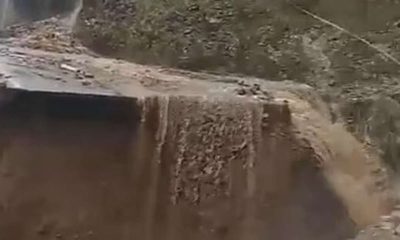
 India News11 hours ago
India News11 hours agoLandslide hits Arunachal Pradesh, highway linking Indo-China border affected
-

 Education9 hours ago
Education9 hours agoFarmer’s son Nilkrishna Gajare Nirmalkumar from Maharashtra scores 100 NTA score in IIT-JEE Mains 2024
-

 Entertainment10 hours ago
Entertainment10 hours agoBollywood stars Salman Khan, Alia Bhatt, Rekha, Sonakshi Sinha, Aditi Rao Hydari attend Sanjay Leela Bhansali’s Heeramandi premiere
-

 India News11 hours ago
India News11 hours agoTamannaah Bhatia summoned in illegal IPL streaming app case, to appear before cyber cell on April 29
-
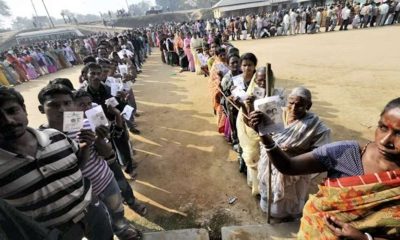
 2024 Lok Sabha Elections10 hours ago
2024 Lok Sabha Elections10 hours agoBihar: Election Commission extends voting timings for 4 Lok Sabha seats due to heatwave
-

 Cricket news11 hours ago
Cricket news11 hours agoIPL 2024: Rishabh Pant, Axar Patel score half centuries as Delhi Capitals beat Gujarat Titans by 4 runs
-
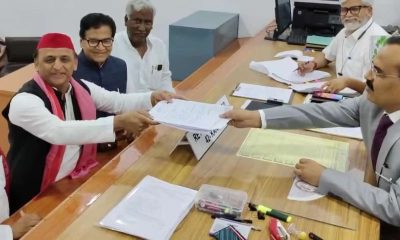
 2024 Lok Sabha Elections9 hours ago
2024 Lok Sabha Elections9 hours agoLok Sabha elections: Samajwadi Party chief Akhilesh Yadav files nomination from Kannauj
-

 Cricket news4 hours ago
Cricket news4 hours agoTelugu superstar Mahesh Babu meets SRH captain Pat Cummins, says it is an absolute honour



